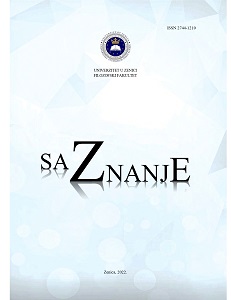OD TRADICIONALNE KA SAVREMENOJ ODGOJNO-OBRAZOVNOJ PARADIGMI TEMELJENOJ NA TRANSAKCIJSKOJ I TRANSFORMACIJSKOJ ORIJENTACIJI KURIKULUMA
FROM TRADITIONAL TO CONTEMPORARY EDUCATIONAL PARADIGM BASED ON TRANSACTIONAL AND TRASFORMATIONAL CURRICULUM ORIENTATION
Author(s): Rasema DelićSubject(s): School education, History of Education, State/Government and Education, Sociology of Education, Pedagogy
Published by: Filozofski fakultet, Univerzitet u Zenici
Keywords: traditional and modern school; curriculum; curriculum orientations; school culture and climate;
Summary/Abstract: Modern society at all levels and interpersonal interactions requires constant development and initiates continuous change. Existing education is less and less able to respond to the demands of modern society, i.e. the demands of consumers, if its practice/service is not based on plans that follow the real needs of users. Methodical practice based on the contents and mechanical adoption of facts that do not lead to the development of competencies necessary for a quality life in the modern age question the purposefulness of the school and everything that represents its identity. The phrase "lifelong learning" is imposed and it loses its meaning through the approach to teaching focused on the traditional curriculum (list of previously set teaching units/ contents) which with ignorance of teaching strategies results in loss of motivation to learn and teach because it does not reflect real interests and the need of students (but also teachers). In this regard, we can look at the innovation of the teaching process through the intentional educational process that we perceive by organizing activities that are not imposed "from outside" but are created in response to the needs of children. The paper starts from a critical comparison of traditional and modern schools, operationalizing the concept and types of curricula with a focus on the curriculum that cultivates individualized learning and is encouraged by thematic teaching. The results of the research show that teachers plan an educational process that is based on educational goals of teaching and that it does not start from thematic planning based on student needs and learning outcomes. This practice speaks in favor of a transmission-oriented (closed) curriculum. For the needs of the research sample, suggestions were given on how to establish and implement an open curriculum model that allows each individual to develop competencies in accordance with their real needs and potentials, inseparable from social reality.
Journal: saZnanje
- Issue Year: 3/2022
- Issue No: 3
- Page Range: 507-520
- Page Count: 14
- Language: Bosnian

